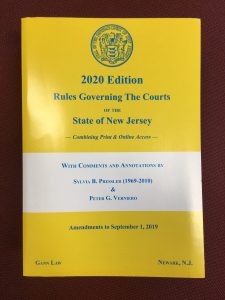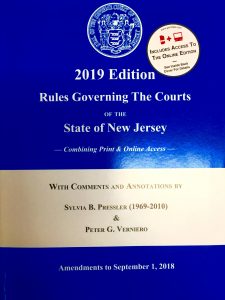In the third and final blog post of this series, I will conclude my summary and discussion of the current 2018 Rule Amendments which have a direct or indirect impact upon Family Part practice in some fashion.
In this blog post, I will discuss a new New Jersey court rule which was adopted, Rule 4:86-7A, which addresses the financial maintenance of incapacitated adults who had been subject to prior Family Part support orders. The purpose of this rule was to give further effect to the terms of N.J.S.A. 2A:17-56.67, et seq. which went into effect in February of 2017. Commonly referred to as the “emancipation” statute, its focus was actually the modification of current law relating to the duration and termination of child support obligations. Under this law, the obligation to pay child support would terminate by “operation of law” and without order by the court on a date that a child marries, dies, enters the military service, or reaches 19 years of age, unless (1) another age for the termination of child support is specified in a court order, but in no event beyond the date the child reaches 23 years of age, or (2) upon written request seeking the continuation of child support beyond the age of 19 for a child (a) who is still enrolled in high school or other secondary education program, (b) was a student in a post-secondary educational program and enrolled for what the school considers to be full-time attendance during part of at least five (5) calendar months of the year, or (c) has a physical or mental disability as determined by the federal or state governmental agency existing prior to the child reaching age 19 and requiring continued child support. Absent this, a parent could only seek to extend child support beyond the age of 19 by motion (due to exceptional circumstances as may be approved by the court); however, the statute also provided that it was not intended to prevent a child who is beyond 23 years of age and/or his parent from seeking a court order requiring the payment of other forms of financial maintenance or reimbursement from a parent as authorized by law to the extent same was not payable or enforceable “child support” as defined in N.J.S.A. 2A:17-56.52, or prevent the court upon application due to exceptional circumstance including but not limited to a mental or physical disability, from converting a child support obligation to another form of financial maintenance for a child who had reached the age of 23.
The purpose of Rule 4:86-7A was to set forth the process and procedure to be filed for an application for conversion of a child support obligation for an alleged or adjudicated incapacitated person who has reached the age of 23 to another form of financial maintenance pursuant to the aforementioned statute. First, the Rule distinguishes between whether there has or has not been an adjudication of incapacity of the person for whom financial maintenance is being sought. If there has not already been an adjudication of incapacity, the plaintiff filing a complaint for adjudication of incapacity and the appointment of a guardian pursuant to Rule 4:86-2 may request such conversion in a separate count of the complaint. If there has already been an adjudication of incapacity, a guardian or custodial parent of that adjudicated incapacitated person may request such conversion by filing a motion on notice to the parent responsible for paying child support and any interested parties setting forth the basis for relief requested pursuant to Rule 4:86-7. In either event, the application shall set forth the exceptional circumstances pursuant to which such conversion is requested and shall annex thereto copies of any Chancery Division, Family Part orders relating to to the child support obligation, as well as a financial maintenance statement in such form as may be promulgated by the Administrative Director of the Courts.
 impacting upon Family Part practice had been amended. In this blog post, I will continue this discussion, summarizing some additional court rule amendments, including those which were in response to, or in clarification of, statutory changes which went into effect over the last few years.
impacting upon Family Part practice had been amended. In this blog post, I will continue this discussion, summarizing some additional court rule amendments, including those which were in response to, or in clarification of, statutory changes which went into effect over the last few years. New Jersey Divorce and Family Lawyer Blog
New Jersey Divorce and Family Lawyer Blog


